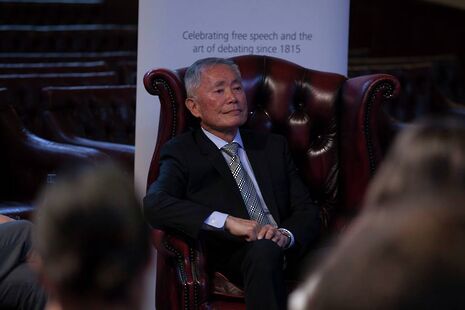George Takei: “Trump is more of a Klingon”
During his visit to Cambridge, actor George Takei speaks to Varsity about Star Trek, ‘Britainophilia’ and why Donald Trump is like a Klingon

“We were imprisoned during the Second World War. We were innocent American citizens, but we happened to be of Japanese ancestry, and because of that, because we looked like the people who bombed Pearl Harbour, they put us in barbed-wire prisons, with no charges – very unconstitutional! And no trial, because you need charges to challenge in a court of law.”
The life behind Mr George Takei, legendary actor, activist and internet personality may come as a surprise to those who recognise him as the grinning godfather of modern ‘meme culture’.
Takei was in Cambridge last week, both as a tourist and a speaker at the Cambridge Union. In a short gap between sightseeing and public speaking, he seems happy and relaxed as he sits down to reflect on a long career both championing civil rights and acting in fantasy entertainment. Accordingly, he drifts effortlessly (and sometimes unnervingly) between serious political talk and cheerful banter, holding the room in silent attention, and then releasing it again with a sharp joke and his trademark baritone chuckle.
50 years after his debut role as Lt. Sulu in Star Trek, Takei is still pleased and a little bemused when he meets dedicated fans. His talk of Star Trek days, however, focuses on its social power, as “more than just a wonderful action-adventure space opera”. His favourite episode featured American television’s first interracial kiss, and was banned in several states. “That was the worst rated episode of all the Star Treks we’ve had”, he says with a proud smile.
He insists that his life as an actor and an activist are “interrelated”. After spending an adolescence perplexed by “the shining ideals” of a country that imprisoned him and his family, he decided that he would dedicate his life to fighting for equality of all kinds: “I became an activist in my late teenage years. I was involved in the Civil Rights movement, I marched with Dr Martin Luther King; I met him and shook his hand. During the Vietnam War I was active in the peace movement…and later on I was an activist in getting an apology and redress for the unconstitutional imprisonment [of the American Japanese]”.
“In fact, this February, we just closed a musical on the internment of Japanese Americans, called Allegiance, so that’s been a part of my acting career”.
Takei’s career has helped him to reconcile his love of America with the way it treated him and his family in his youth. He was inspired by his father, “who explained to me that our democracy is a people’s democracy, and people have the capacity to do great things, but we are also fallible human beings”. He recognised that the same system which mistreated him would grant him the power to change it.
He also inherited from his father a love of Britain (he was named after King George VI). Asked about his self-professed status as a ‘Britainophile’, he explains that he used to call himself an Anglophile, as his father did, but updated his status after an awkward silence when he merrily declared himself “a confirmed Anglophile” in a Scottish pub.
He is reluctant, however, to take a serious stance on LGBT activism in Britain, not being familiar enough with our laws and culture, much less those of “Cambridge-shire” (charmingly mispronounced as though we were in Middle Earth).
Moving back towards home, he speaks sternly about how he “raged with anger” at Governor Arnold Schwarzenegger for bowing to his conservative base and going back on his word regarding marriage equality in California. When the California Supreme Court judged that everyone in the state is entitled to marry the person they love, regardless of gender, he and his partner of 21 years, Brad Altman, became the first couple in West Hollywood to apply for a marriage licence, and were married on 14th September 2008.
With some distress he speaks about the states which are now defying the nationwide Supreme Court ruling allowing marriage equality: “They’re passing bills which justify not approving marriage equality, by using the words ‘religious freedom’, in other words trying to hide behind the religion of the people. But, they don’t understand the United States constitution. Religious freedom is for everyone, and we have a pluralistic society, many, many different faiths, and no one faith can write their beliefs into civil law and discriminate against somebody else."
He is pleased, however, in his certainty that “Hillary Clinton will become the first female President of the United States”. He dismisses fears of a Trump presidency, and when asked how Trump would fare as captain of the enterprise, he jeers, “Oh, no – he’s much more of a Klingon!”
These jibes to some extent define Takei’s current public persona – he does not shy away from making fools of people who make fools of themselves. There is something righteous about the 79-year-old sharing his most epic online takedowns: “What if you’re just an a-hole with no balls. Which bathroom would YOU use then, Mr M***?” he asks one transphobic Twitter user who mocked transgender people’s identities and use of public toilets. With close to 10 million followers on Facebook, he continues to exert considerable social influence in the modern age of digital activism.
It seems that throughout his whole life his ideals have not changed at all, hugely ahead of his time in the 1960s, and sadly, perhaps still so. He remains positive and confident that his cause is just and is supported by the “shining ideals” of his nation’s constitution. Ultimately, he is proud of the nation he calls home, frustrated by its conservative right, but overwhelmed by the changes he has made there and the support he has received across the globe.
 News / Local business in trademark battle with Uni over use of ‘Cambridge’17 January 2026
News / Local business in trademark battle with Uni over use of ‘Cambridge’17 January 2026 News / Cambridge bus strikes continue into new year16 January 2026
News / Cambridge bus strikes continue into new year16 January 2026 Comment / Fine, you’re more stressed than I am – you win?18 January 2026
Comment / Fine, you’re more stressed than I am – you win?18 January 2026 News / News in Brief: cosmic connections, celebrity chefs, and ice-cold competition18 January 2026
News / News in Brief: cosmic connections, celebrity chefs, and ice-cold competition18 January 2026 Film & TV / Anticipating Christopher Nolan’s The Odyssey17 January 2026
Film & TV / Anticipating Christopher Nolan’s The Odyssey17 January 2026









